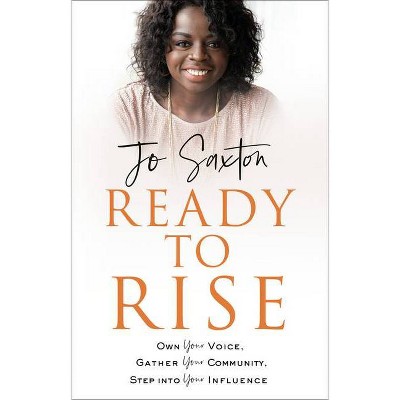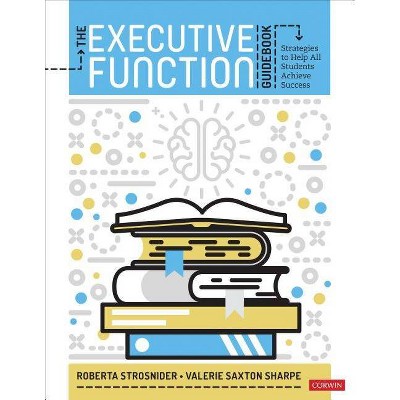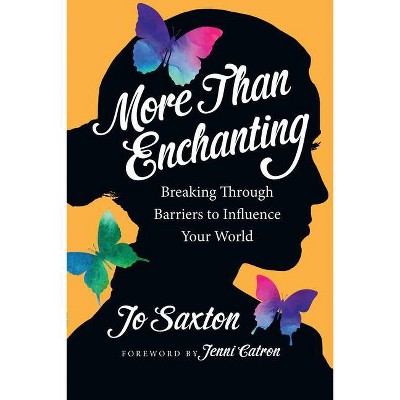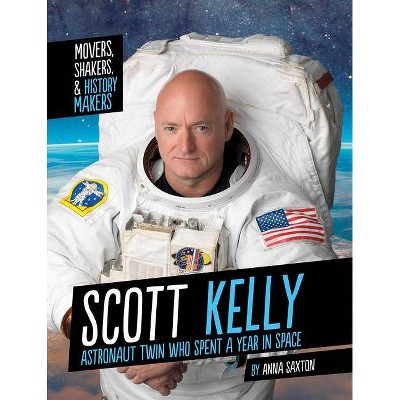The Titanic Effect - by Todd Saxton & M Kim Saxton & Michael Cloran (Paperback)
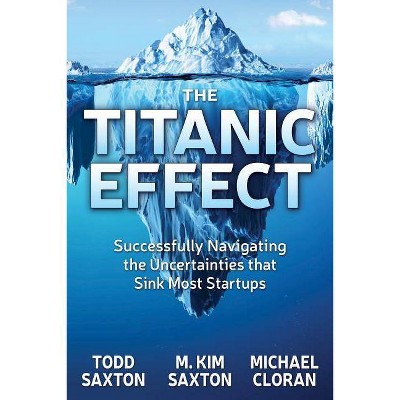
Similar Products
Products of same category from the store
AllProduct info
<p/><br></br><p><b> About the Book </b></p></br></br>Unlike other "how-to" entrepreneurship books, <i>The Titanic Effect</i> uses stories of success and failure to reveal the often-overlooked "icebergs" that sink startups.<p/><br></br><p><b> Book Synopsis </b></p></br></br>"I have read dozens of books on starting companies, but this is the first that accurately captures why startups fail and provides a tool for entrepreneurs and investors to measure and manage these sources of failure." Michael Hatfield, Co-Founder, Cerent, Calix, Cienna, and Carium.<p> <b>What makes a startup successful? </b><br> This book, from award-winning business school professors and a tech serial entrepreneur, tells what makes startups successful. Instead of telling startups what to do, like most startup books, they share what startups should avoid. Along the way, they share small business startup success stories gleaned from the <i>How Built This Podcast</i> and their firsthand experiences. These stories of startup success are contrasted with stories of startup failure from startup graveyards and most notably, the Titanic. Like many of today's startups, the Titanic hoped to disrupt the transportation industry of its time. It fell short, to a disastrous outcome, from the same sources that prevent startup success today.<p> <b>Get a startup game plan!</b><br> This startup book uses the <i>Titanic</i> and a sailing metaphor to provide a startup roadmap template. It shows what makes startups successfully navigate through challenges in startup investing, founding, and hiring with a game plan to get through the Human Ocean. It offers a startup guide to customer success in working through the Marketing Ocean. It even highlights what startups need to invest in to get through the Technical and Strategy Oceans. Its Iceberg Index gives entrepreneurs, startups, and small businesses a way to track their progress on the startup roadmap template. It also helps investors assess what startups to invest in.<p> Many entrepreneurs assume that the <i>Titanic</i> was sunk by a single iceberg. <i>The Titanic Effect</i> shows, that like many startups, it's not a single misstep but a series of mistakes that keep a startup from being successful. This combination of missteps is called the Titanic Effect.<p> <b>Who can benefit from this startup roadmap?</b><br> <li>Entrepreneurs in the early stages of building a startup. They will learn what makes a startup successful. They will develop a to-do list of decisions to make and actions to take.</li> <li>Small business owners will also identify key next steps to building their startup game plan. <li>Investors can identify what to avoid in startup investments and what startups to invest in. <li>Students will learn how to evaluate the success potential of a startup and will read small business and startup success stories.<p> These three co-authors have witnessed firsthand what leads to startup success. They have made it their mission to help entrepreneurs, startup founders and startup investors succeed. Drs. Todd and M. Kim Saxton bring more than two decades of academic and professional experience in business strategy, entrepreneurship, marketing, and angel investing. Serial tech entrepreneur, Michael Cloran, adds his two decades' of experiences in launching his own startups as well as building software products for other startups. In addition, the co-authors serve on various boards of entrepreneurial ventures and startup advisory associations. They have shared their expertise from the stage to dozens of audiences, including students, entrepreneurship and professional development associations, academic societies, and global companies like Roche Diagnostics and Pfizer Pharmaceuticals.<p/><br></br><p><b> Review Quotes </b></p></br></br><br>"The gripping story told in this book masks the expert research and deep insights upon which it is based. Don't let the fun of reading this book fool you--it is must-reading, not just for entrepreneurs launching and growing their ventures but for anyone remotely interested in how our entrepreneurial economy functions."<br> David B. Audretsch<br> Distinguished Professor<br> Ameritech Chair of Economic Development<br> Director, Institute for Development Strategies<br> Global Award for Entrepreneurship Honoree<br> School of Public and Environmental Affairs, Indiana University<p> "I love it! The whole concept of hidden debt is perfect and something very real that I've experienced but never defined before. I highly recommend this to both first-timers and seasoned entrepreneurs."<br> Chris Baggott<br> Founder, ExactTarget, Compendium, Tyner Pond Farm, and ClusterTruck<p> "The advice in this book is not just for tech entrepreneurs. As a restaurateur, I have had my share of successes and failures. Both came down to the right or wrong decisions I made regarding the people, the product, and/or the market I was targeting. Being aware in advance of the "debtbergs" described in <i>The Titanic Effect</i> would have helped me save a lot of time and money."<br> Gary Brackett<br> Owner and CEO, Stacked Pickle<p> "This aptly named book is an outstanding treatise on navigating uncertainty. It is essential reading for any physician who has a penchant for the entrepreneurial world. The authors' many years of experience as both innovators and educators uniquely qualify them as seasoned "captains" who would be welcomed on any physician's entrepreneur journey to success."<br> Anthony C. Chang, MD, MBA, MPH, MS<br> Chief Intelligence and Innovation Officer<br> Medical Director, The Sharon Disney Lund Medical Intelligence and Innovation Institute (MI3)<br> Children's Hospital of Orange County<p> "The Startup Ladies were fortunate to have hosted a <i>Titanic Effect</i> workshop. The book is a life jacket for a first-time founder. It helps you understand, anticipate, and solve problems that are just below the surface of a startup."<br> Kristen Cooper<br> CEO and Founder, The Startup Ladies<p> "<i>The Titanic Effect</i> is a no-nonsense and easy-to-understand "field guide" to startups. For entrepreneurs, it offers critical, hard-earned insights that are typically only learned through failure. For early-stage investors, it gives wisdom and tools to effectively evaluate startups and determine your own investment strategy."<br> Barb Cutillo<br> Financial Consultant and Investor in Early-Stage Companies<br> Co-Founder/CFO/CAO, Stonegate Mortgage Corporation<p> "The nature of entrepreneurship is to venture into unfamiliar territory. As an investor, we often see entrepreneurs who teach themselves lessons the hard way, though trial and error. I would encourage all would-be entrepreneurs to absorb the several great lessons in this volume to anticipate common pitfalls and strategize corrective action to speed the iterative process of business building."<br> Dan Gebremedhin MD, MBA<br> Principal, Flare Capital Partners<p> "The investment world often debates distinguishing factors between luck and skill. Both are necessary, but neither alone is sufficient for success. <i>The Titanic Effect</i> unpacks the skills and helps decipher luck, and is a must-read for entrepreneurs to navigate their journeys to target destinations."<br> Ting Gootee<br> Chief Investment Officer, Elevate Ventures<p> "I have read dozens of books on starting companies, but this is the first that accurately captures why startups fail and provides a tool for entrepreneurs and investors to measure and manage these sources of failure."<br> Michael Hatfield, <br> Co-Founder, Cerent, Calix, Cienna (Cyan), and Carium<p> "As a retired surgeon, serial entrepreneur, life-science and healthcare investor and champion, as well as Co-Founder and Chairman of the Board of the Society of Physician Entrepreneurs, I am thrilled to see a book directed to improving the success of innovators, both in our sector and in general. This is a well-organized, thoughtfully written work, both from the perspective of the entrepreneur as well as the potential early-stage investor.<p> I often counsel and mentor young entrepreneurs that they have three important assets to monitor and nurture as they grow their companies. They are Money, People, and Time, each of which seems to take on different prominence and priority depending on the various stages of the company's development. My suggestion is that they read <i>The Titanic Effect</i>, and in doing so they might save some money, associate with the right people, and recognize that time is truly their most precious commodity."<br> Jeffrey N. Hausfeld, M.D., M.B.A., F.A.C.S.<br> Chairman of the Board and CMO, BioFactura Inc.<br> President, Memory Care Communities LLC<br> Chairman and Founder, The Society of Physician Entrepreneurs<p> "One of the biggest blind spots for an entrepreneur in building a startup for the first time is "You don't know what you don't know." What keep me up at night are not usually the problems I am aware of or the decisions I know I need to execute. The sleeplessness is usually from the anxiety of "What am I missing right now that is going to be a problem later?" <i>The Titanic Effect</i> goes a long way in giving answers to that very question and gives any reader immediately more wisdom.<p> I have known Todd, Kim, and Michael for over ten years, and all three have played a part in advising me on how to navigate the choppy waters of entrepreneurship. I am excited to see all of their expertise consolidated and made available to founders everywhere."<br> Scott Hill<br> Executive Chairman and Co-Founder, PERQ<p> "I am honored to have known Todd for almost two decades. Todd, Kim, and Michael have been pillars in Indiana, guiding entrepreneurs and promoting venture-building in the area. They have figured out a novel way to explain to entrepreneurs and investors how not to get into traps by creating massive debtbergs (akin to icebergs that doomed the <i>Titanic</i>) during the course of an entrepreneurial journey. [This book is] an interesting must-read for aspiring and established entrepreneurs and investors. I am sure a reader will spot such patterns in his/her entrepreneurial journey and proactively apply the learnings from this book."<br> Mukund Krishna<br> Founder and CEO, Suyati Group India<p> "They say hindsight is 20/20, and this is typically true. The terrible <i>Titanic</i> tragedy is a dark yet very real and valuable metaphor for the many events or "debts" that lead to startup failure today. These events (as trivial as they may seem) often combine for a multiplicative effect that culminates in failure. The irony is that most of the debts we know of are obvious (e.g., the iceberg sticking out of the water). <i>The Titanic Effect</i> takes a much deeper dive into the more vague, yet critical "hidden debts" that can cripple and sink any company, no matter how big or how small. This is an essential read for anyone in the "entrepreneurial community" that interacts, advises, or just exists alongside these startups. The comparisons between the <i>Titanic</i> event and the startup world also make this book entertaining and historically educational. Highly recommended!"<br> Oscar Moralez<br> Managing Director, VisionTech Partners & VisionTech Angels<p> "There are many books on entrepreneurship but very few that capture the insights, understanding, and actionable ideas shared in <i>The Titanic Effect</i>. I've had the opportunity to partner with all three authors, and they bring a wealth of knowledge and experience to light in an entertaining and meaningful way for all entrepreneurs."<br> Dave Wortman<br> CEO, Diagnotes<br> Former CEO, Made2Manage<p> "In my years in business development and strategy in the US and China, I have had the opportunity to work with large corporations as well as new technology firms. Both startups and larger firms can learn a lot from the ideas in <i>The Titanic Effect</i> regarding the perils of innovating without attention to tradeoffs. I particularly appreciate the effort to include entrepreneurial stories of founders and startups outside of the United States, in addition to the excellent examples of US ventures."<br> Gilbert Wu<br> President, Greater China, Aventics<br>
Price History
Cheapest price in the interval: 14.59 on October 22, 2021
Most expensive price in the interval: 14.59 on November 8, 2021
Price Archive shows prices from various stores, lets you see history and find the cheapest. There is no actual sale on the website. For all support, inquiry and suggestion messagescommunication@pricearchive.us


